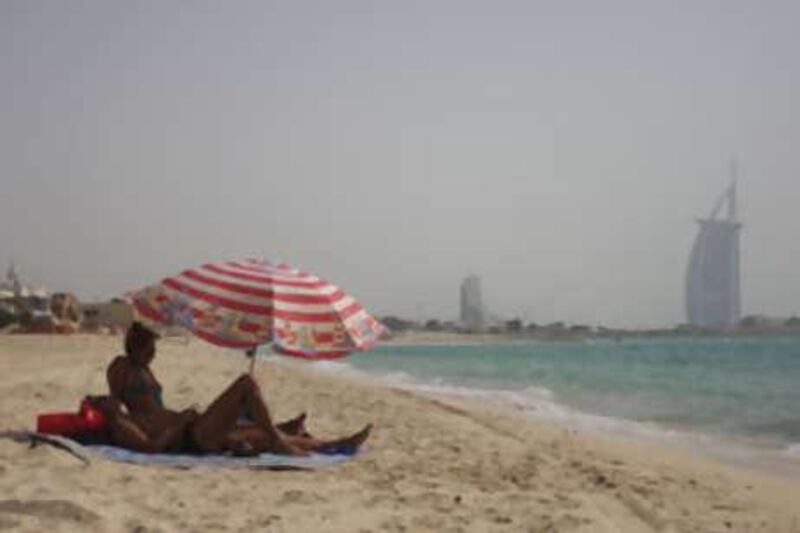NEW YORK // World tourism chiefs are responding to fears of an industry-wide slump by boosting co-operation to help the UAE and other holiday destinations prepare for an impending downturn. Geoffrey Lipman, the assistant secretary general of the UN's World Travel Organisation, held out hope that the Emirates could stave off recession because it has been a booming holiday market.
A UN report this week presented a bleak outlook by predicting that the economic crisis will see global unemployment figures increase by 20 million, with tourism among the "hardest hit" sectors. Financial belt-tightening by British and North American holidaymakers - among the biggest spenders on holidays to the Emirates - will have an obvious impact that cannot be overlooked. "What is clear is that tourism follows macroeconomics as well as related commercial and consumer confidence trends - and the real impacts there have become significant only in recent months," Mr Lipman said.
"My gut feeling is that the Middle East region, including the UAE, will track global trends and hence will have a comparatively higher result than the norm because it has shown significantly higher results in the recent past." The Emirates recorded substantial growth in the first quarter of the year, with 5.7 per cent more tourists than during the same period last year. Despite the spectre of dwindling visitor numbers, those inside the Emirates tourism industry remain bullish, with Dubai's Department of Tourism and Commerce Marketing (DTCM) presenting a rosier outlook. "We continue to see increased growth and are supporting the airlines to drive consumer traffic," the DTCM said. "The data we are working from shows that it is domestic travel markets that are being affected, the 'drive destinations', whereas the luxury market for wealthy travellers visiting long-haul destinations remains strong."
According to DTCM figures, most of Dubai's visitors hail from the UK, the US, Canada, Russia and Germany - some of the nations that have already taken measures to salvage failing banks. Dubai targeted top-end North American couples earning combined incomes of more than US$114,000 (Dh419,000), the DTCM said, adding that this group was still spending on holidays. The recent launch of direct Emirates flights between Toronto and Dubai is part of a larger North American expansion, with non-stop routes also planned to connect Los Angeles and San Francisco with the Gulf sunshine hub.
"They're not opening these routes because of hope. They are being opened because there is the demand and they are flying at full capacity," the DTCM said. "This is something we expect to continue." Although the travel industry initially appeared robust against global economic downturn, a slowdown in people taking holidays in the northern hemisphere this summer was an early indicator of trouble on the horizon.
The World Tourism Barometer, compiled by a panel from the travel organisation, "now shows a perceptible loss of confidence regarding the short-term outlook", the agency said. "Our view is that all regions will be impacted by the crisis, but we will not have a real indicator of any impacts until November when we will have two important pieces of information - the results for the period through August 2008 and some early indicators for travel bookings in the first quarter of 2009," said Mr Lipman.
To prepare destination markets for a tourism crunch, the UN's travel body has established a so-called "resilience committee" to provide members with constantly updated data about market trends. The body will "get a better feel and sensitivity analysis, and help [travel organisation] members collectively analyse and effectively respond to the dynamically changing situation, as well as collaboratively help the weakest and poorest", Mr Lipman said.
Francesco Frangialli, the secretary general of the travel organisation, warned that numerous travel agencies worldwide were already suffering from the credit crunch, with many consumers cutting back on travel. "Experience teaches us that tourism is resilient, but there is no denying that there is a certain stage of deterioration of the situation beyond which tourism, too, will begin to suffer," Mr Frangialli said.
Although they were still taking holidays, western tourists were not dipping into their pockets as readily while on holiday, spending less on restaurants, transport and entertainment, he said. jreinl@thenational.ae







